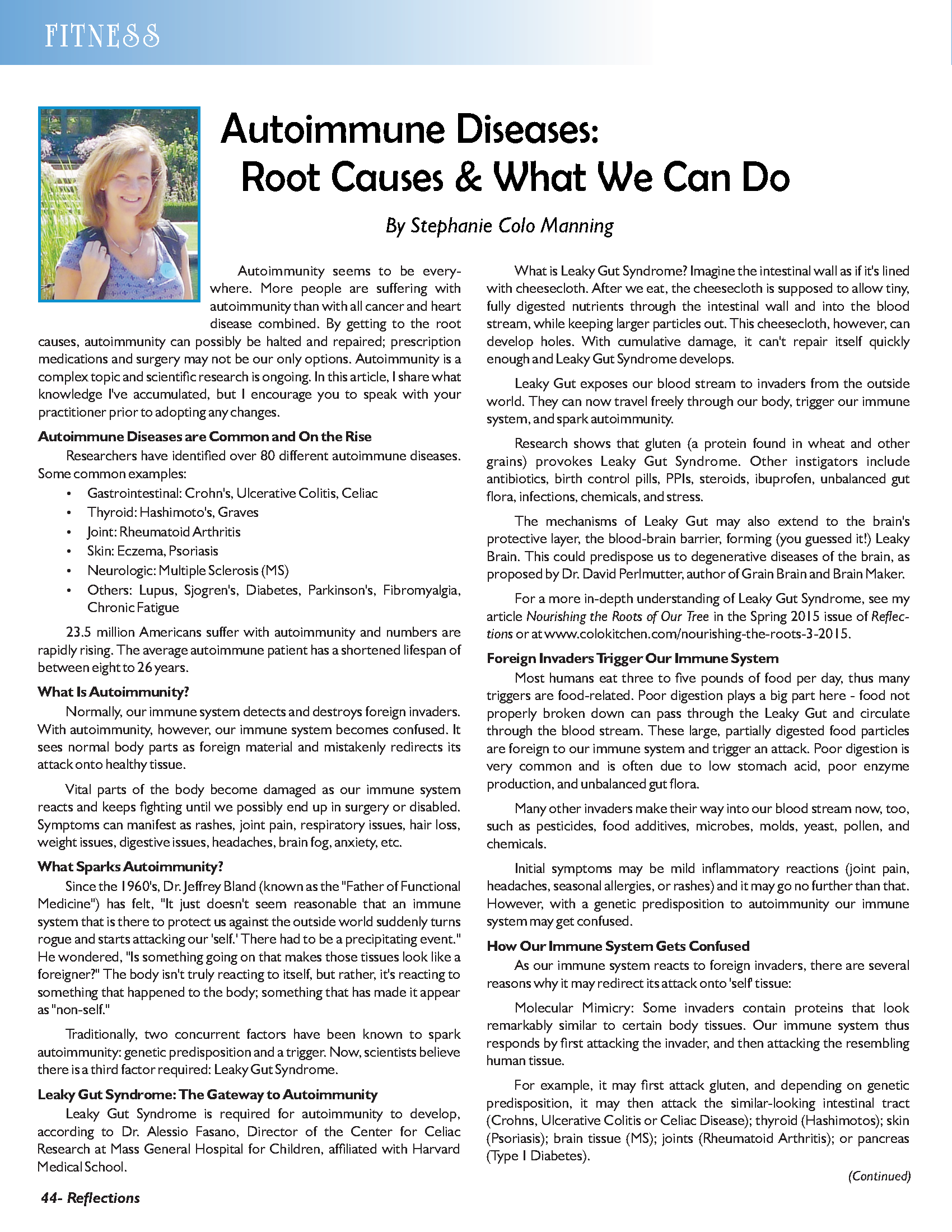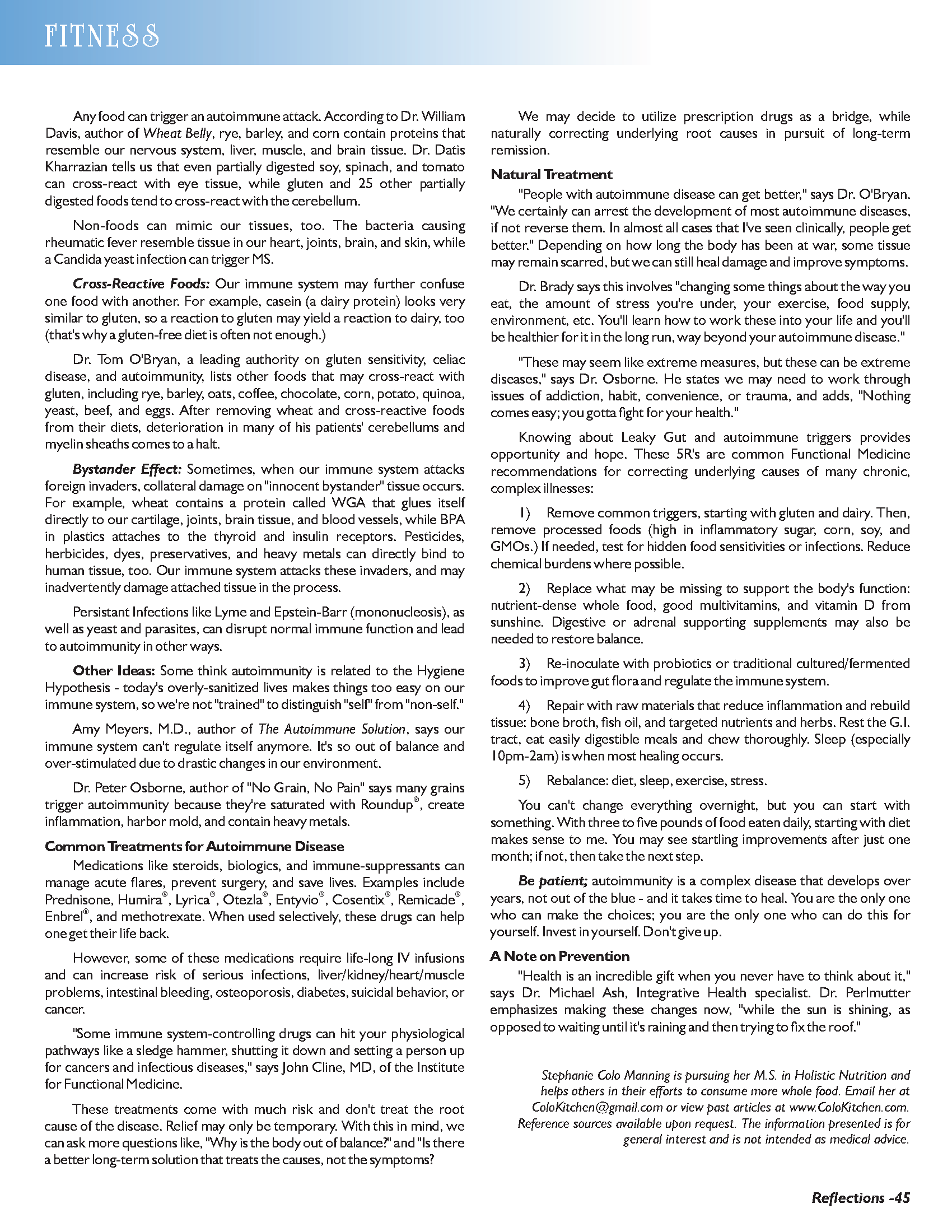Autoimmunity seems to be everywhere. More people are suffering with autoimmunity than with all cancer and heart disease combined. By getting to the root causes, autoimmunity can possibly be halted and repaired; prescription medications and surgery may not be our only options. Autoimmunity is a complex topic and scientific research is ongoing. In this article, I share what knowledge I’ve accumulated, but I encourage you to speak with your practitioner prior to adopting any changes.
Autoimmune Diseases are Common and On the Rise
Researchers have identified over 80 different autoimmune diseases. Some common examples:
- Gastrointestinal: Crohn’s, Ulcerative Colitis, Celiac
- Thyroid: Hashimoto’s, Graves
- Joint: Rheumatoid Arthritis
- Skin: Eczema, Psoriasis
- Neurologic: Multiple Sclerosis (MS)
- Others: Lupus, Sjogren’s, Diabetes, Parkinson’s, Fibromyalgia, Chronic Fatigue
23.5 million Americans suffer with autoimmunity and numbers are rapidly rising. The average autoimmune patient has a shortened lifespan of between eight to 26 years.
What Is Autoimmunity?
Normally, our immune system detects and destroys foreign invaders. With autoimmunity, however, our immune system becomes confused. It sees normal body parts as foreign material and mistakenly redirects its attack onto healthy tissue.
Vital parts of the body become damaged as our immune system reacts and keeps fighting until we possibly end up in surgery or disabled. Symptoms can manifest as rashes, joint pain, respiratory issues, hair loss, weight issues, digestive issues headaches, brain fog, anxiety, etc.
What Sparks Autoimmunity?
Since the 1960’s, Dr. Jeffrey Bland (known as the “Father of Functional Medicine”) has felt, “It just doesn’t seem reasonable that an immune system that is there to protect us against the outside world suddenly turns rogue and starts attacking our ‘self.’ There had to be a precipitating event.” He wondered, “Is something going on that makes those tissues look like a foreigner?” The body isn’t truly reacting to itself, but rather, it’s reacting to something that happened to the body; something that has made it appear as “non-self.”
Traditionally, two concurrent factors have been known to spark autoimmunity: genetic predisposition and a trigger. Now, scientists believe there is a third factor required: Leaky Gut Syndrome.
Leaky Gut Syndrome: The Gateway to Autoimmunity
Leaky Gut Syndrome is required for autoimmunity to develop, according to Dr. Alessio Fasano, Director of the Center for Celiac Research at MassGeneral Hospital for Children, affiliated with Harvard Medical School.
What is Leaky Gut Syndrome? Imagine the intestinal wall as if it’s lined with cheesecloth. After we eat, the cheesecloth is supposed to allow tiny, fully-digested nutrients through the intestinal wall and into the blood stream, while keeping larger particles out. This cheesecloth, however, can develop holes. With cumulative damage, it can’t repair itself quickly enough and Leaky Gut Syndrome develops.
Leaky Gut exposes our blood stream to invaders from the outside world. They can now travel freely through our body, trigger our immune system, and spark autoimmunity.
Research shows that gluten (a protein found in wheat and other grains) provokes Leaky Gut Syndrome. Other instigators include antibiotics, birth control pills, PPIs, steroids, ibuprofen, unbalanced gut flora, infections, chemicals, and stress.
The mechanisms of Leaky Gut may also extend to the brain’s protective layer, the blood-brain barrier, forming (you guessed it!) Leaky Brain. This could predispose us to degenerative diseases of the brain, as proposed by Dr. David Perlmutter, author of Grain Brain and Brain Maker.
For a more in-depth understanding of Leaky Gut Syndrome, see my article Nourishing the Roots of Our Tree in the Spring 2015 issue of Reflections at https://colokitchen.com/writings/nourishing-the-roots/
Foreign Invaders Trigger Our Immune System
Most humans eat three to five pounds of food per day, thus many triggers are food-related. Poor digestion plays a big part here – food not properly broken down can pass through the Leaky Gut and circulate through the blood stream. These large, partially-digested food particles are foreign to our immune system and trigger an attack. Poor digestion is very common and is often due to low stomach acid, poor enzyme production, and unbalanced gut flora.
Many other invaders make their way into our blood stream now, too, such as pesticides, food additives, microbes, molds, yeast, pollen, and chemicals.
Initial symptoms may be mild inflammatory reactions (joint pain, headaches, seasonal allergies, or rashes) and it may go no further than that. However, with a genetic predisposition to autoimmunity our immune system may get confused.
How Our Immune System Gets Confused
As our immune system reacts to foreign invaders, there are several reasons why it may redirect its attack onto ‘self’ tissue:
Molecular Mimicry: Some invaders contain proteins that look remarkably similar to certain body tissues. Our immune system thus responds by first attacking the invader, and then attacking the resembling human tissue.
For example, it may first attack gluten, and depending on genetic predisposition, it may then attack the similar-looking intestinal tract (Crohns, Ulcerative Colitis or Celiac Disease); thyroid (Hashimotos); skin (Psoriasis); brain tissue (MS); joints (Rheumatoid Arthritis); or pancreas (Type 1 Diabetes).
Any food can trigger an autoimmune attack. According to Dr. William Davis, author of Wheat Belly, rye, barley, and corn contain proteins that resemble our nervous system, liver, muscle, and brain tissue. Dr. Datis Kharrazian tells us that even partially-digested soy, spinach, and tomato can cross-react with eye tissue, while gluten and 25 other partially-digested foods tend to cross-react with the cerebellum.
Non-foods can mimic our tissues, too. The bacteria causing rheumatic fever resemble tissue in our heart, joints, brain, and skin, while a Candida yeast infection can trigger MS.
Cross-Reactive Foods: Our immune system may further confuse one food with another. For example, casein (a dairy protein) looks very similar to gluten, so a reaction to gluten may yield a reaction to dairy, too (that’s why a gluten-free diet is often not enough.)
Dr. Tom O’Bryan, a leading authority on gluten sensitivity, celiac disease, and autoimmunity, lists other foods that may cross-react with gluten, including rye, barley, oats, coffee, chocolate, corn, potato, quinoa, yeast, beef, and eggs. After removing wheat and cross-reactive foods from their diets, deterioration in many of his patients’ cerebellums and myelin sheaths comes to a halt.
Bystander Effect: Sometimes, when our immune system attacks foreign invaders, collateral damage on “innocent bystander” tissue occurs. For example, wheat contains a protein called WGA that glues itself directly to our cartilage, joints, brain tissue, and blood vessels, while BPA in plastics attaches to the thyroid and insulin receptors. Pesticides, herbicides, dyes, preservatives, and heavy metals can directly bind to human tissue, too. Our immune system attacks these invaders, and may inadvertently damage attached tissue in the process.
Persistant Infections like Lyme and Epstein-Barr (mononucleosis), as well as yeast and parasites, can disrupt normal immune function and lead to autoimmunity in other ways.
Other Ideas: Some think autoimmunity is related to the Hygiene Hypothesis – today’s overly-sanitized lives makes things too easy on our immune system, so we’re not “trained” to distinguish “self” from “non-self.”
Amy Meyers, M.D., author of The Autoimmune Solution, says our immune system can’t regulate itself anymore. It’s so out of balance and over-stimulated due to drastic changes in our environment.
Dr. Peter Osborne, author of “No Grain, No Pain” says many grains trigger autoimmunity because they’re saturated with Roundup®, create inflammation, harbor mold, and contain heavy metals.
Common Treatments for Autoimmune Disease
Medications like steroids, biologics, and immune-suppressants can manage acute flares, prevent surgery, and save lives. Examples include Prednisone, Humira®, Lyrica®, Otezla®, Entyvio®, Cosentix®, Remicade®, Enbrel®, and methotrexate. When used selectively, these drugs can help one get their life back.
However, some of these medications require life-long IV infusions and can increase risk of serious infections, liver/kidney/heart/muscle problems, intestinal bleeding, osteoporosis, diabetes, suicidal behavior, or cancer.
“Some immune system-controlling drugs can hit your physiological pathways like a sledge hammer, shutting it down and setting a person up for cancers and infectious diseases,” says John Cline, MD, of the Institute for Functional Medicine.
These treatments come with much risk and don’t treat the root cause of the disease. Relief may only be temporary. With this in mind, we can ask more questions like, “Why is the body out of balance?” and “Is there a better long-term solution that treats the causes, not the symptoms?
We may decide to utilize prescription drugs as a bridge, while naturally correcting underlying root causes in pursuit of long-term remission.
Natural Treatment
“People with autoimmune disease can get better,” says Dr. O’Bryan. “We certainly can arrest the development of most autoimmune diseases, if not reverse them. In almost all cases that I’ve seen clinically, people get better.” Depending on how long the body has been at war, some tissue may remain scarred, but we can still heal damage and improve symptoms.
Dr. Brady says this involves “changing some things about the way you eat, the amount of stress you’re under, your exercise, food supply, environment, etc. You’ll learn how to work these into your life and you’ll be healthier for it in the long run, way beyond your autoimmune disease.”
“These may seem like extreme measures, but these can be extreme diseases,” says Dr. Osborne. He states we may need to work through issues of addiction, habit, convenience, or trauma, and adds, “Nothing comes easy; you gotta fight for your health.”
Knowing about Leaky Gut and autoimmune triggers provides opportunity and hope. These 5R’s are common Functional Medicine recommendations for correcting underlying causes of many chronic, complex illnesses:
- Remove common triggers, starting with gluten and dairy. Then, remove processed foods (high in inflammatory sugar, corn, soy, and GMOs.) If needed, test for hidden food sensitivities or infections. Reduce chemical burdens where possible.
- Replace what may be missing to support the body’s function: nutrient-dense whole food, good multivitamins, and vitamin D from sunshine. Digestive or adrenal supporting supplements may also be needed to restore balance.
- Re-inoculate with probiotics or traditional cultured/fermented foods to improve gut flora and regulate the immune system.
- Repair with raw materials that reduce inflammation and rebuild tissue: bone broth, fish oil, and targeted nutrients and herbs. Rest the G.I. tract, eat easily digestible meals, chew thoroughly. Sleep (especially 10pm-2am) is when most healing occurs.
- Rebalance: diet, sleep, exercise, stress.
You can’t change everything overnight, but you can start with something. With three to five pounds of food eaten daily, starting with diet makes sense to me. You may see startling improvements after just one month; if not, then take the next step.
Be patient; autoimmunity is a complex disease that develops over years, not out of the blue – and it takes time to heal. You are the only one who can make the choices; you are the only one who can do this for yourself. Invest in yourself. Don’t give up.
A Note on Prevention
“Health is an incredible gift when you never have to think about it,” says Dr. Michael Ash, Integrative Health specialist. Dr. Perlmutter emphasizes making these changes now, “while the sun is shining, as opposed to waiting until it’s raining and then trying to fix the roof.”
Stephanie Colo Manning holds a Master of Science degree in Holistic Nutrition. The information presented has not been evaluated by the FDA and is not intended to diagnose, treat, prevent, or cure any disease. References available upon request.


